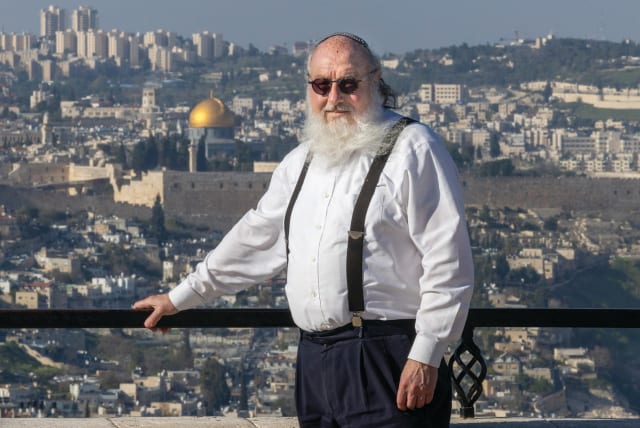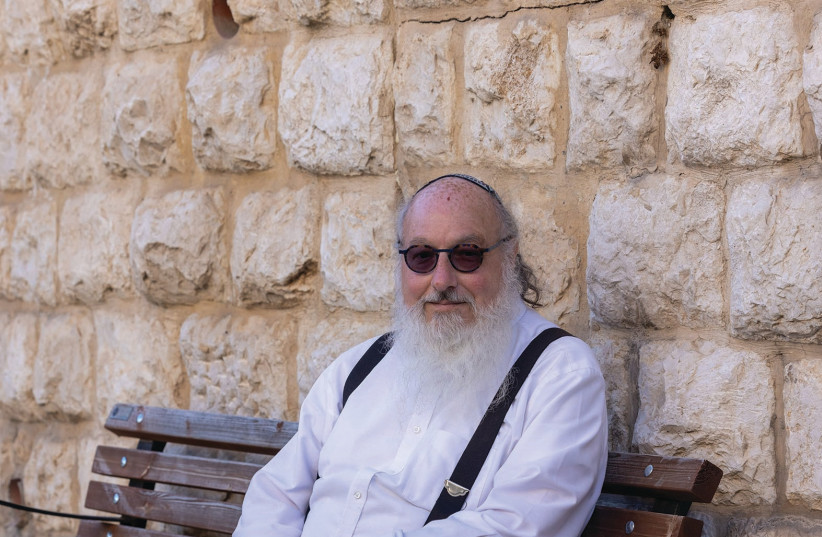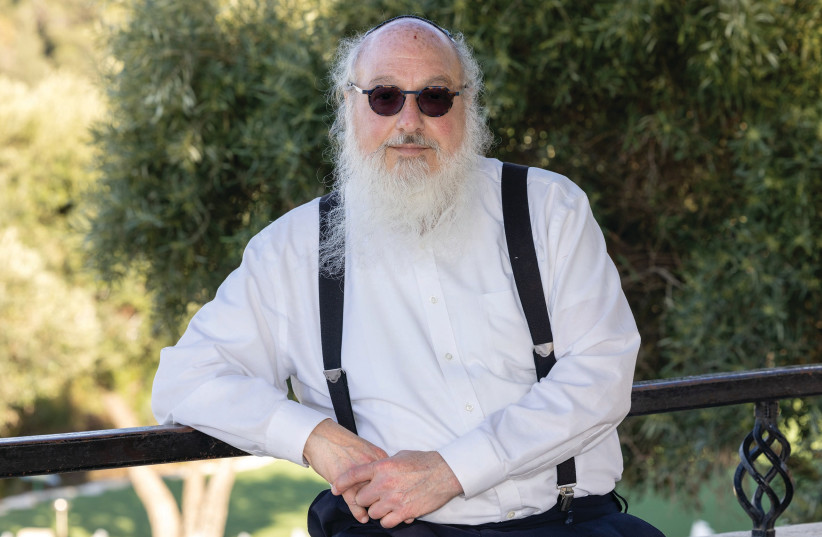What is Israeli spy Jonathan Pollard's life like after aliyah?

The 68-year-old convicted spy Jonathan Pollard says he has moved on from his decades in US prison and is now living in Israel.
Not far from Jerusalem’s city center lives an individual whose name is known around the world. Some consider him a traitor, some a hero and others somewhere in between.
But regardless of the label that’s plastered on Jonathan Pollard, the American-Jewish spy convicted of acts of espionage for Israel and who sat in prison for 30 years, he prefers to be identified as an Israeli.
His home is surrounded by hanukkiot and seforim, the former of which reminds him of Jewish sovereignty in our homeland, and the latter reminds him he is living in a Jewish state.
Since his release from prison and subsequent aliyah just over two years ago with his ailing wife Esther, the once-most famous spy in the world has found himself juggling a tumultuous personal life, a controversial political life and an emerging business one.
The 68-year-old Pollard says he has moved on from his roughly three-decade stint in United States federal prison. He can relate often gruesome tales from life behind bars but pepper them with boyish humor, something he credits with keeping him sane all those years.
After all that time behind bars, Pollard sees Passover and the freedom that it’s focused on in a different light.
“Each Passover, we are told that we should see ourselves as if we were participants in the departure from Egypt. I never really appreciated this until I left prison, after 30 years... it was at that moment that I truly understood what our people must have felt when they realized that they were finally free,” he told The Jerusalem Post during a recent interview.
Pollard's return to Israel
POLLARD’S FIRST few months in Israel were filled with torment and grief. His wife, Esther, was ill with cancer and he felt helpless. She spent 30 years taking care of him while he was in prison and after he only had six years to return the love and loyalty.
As she faced her end, his whole life became dedicated to supporting her. Though he laments that while he was successful in saving seven million Jews he “failed at saving one... the best person I’ve ever met.”
Towards the last few months of her life, Esther introduced Jonathan to her friend Rivka. The two kicked it off, with Pollard being impressed by her passion. After their meeting, Esther asked him if he liked her. Dumbfounded, he asked her why she would ask such an inappropriate question. “Because I won’t be around to make you happy,” his wife responded.
It was then that Pollard knew that she knew it was over, though the thought of loving someone else seemed like an impossible task.
In the end, he caved to Esther’s desire, marrying Rivka roughly five months ago in a ceremony conducted by the former Sephardic Chief Rabbi and the current Chief Rabbi of Jerusalem, Shlomo Amar.
The age difference – Rivkah is 45 years old – created fodder in gossip columns but Pollard ignored that.
Wiping away tears, Pollard says about Esther that “even though she’s dead, she is still here looking out for me... she picked well for me.”
Pollard's right-wing views on Israeli politics
POLLARD HAS not shied away from espousing staunch right-wing viewpoints relating to Israeli politics and the Israel-Palestinian conflict. Be it in calls for Israel to disassociate itself from the US or his position on terror attacks and Palestinians, Pollard has aligned himself with the greater Israel stream of thought.
Despite endorsing Ayelet Shaked before the last elections, Pollard hasn’t gotten involved in politics and says he isn’t interested.
“I can never say never but I find it highly improbable that I would become an MK... I’m not a follower.” Though to Pollard, the issue runs deeper.
“Shortly before Esther’s death, in the COVID ward of Hadassah, she clutched me tightly with what seemed like her last great strength. She said that ‘after I die, the politicians are coming for you,’” Pollard told, explaining that for their life together, Esther was his protector against politicians. “‘What is politics?’ she asked me in her typical rhetorical manner. ‘You won’t live long enough to hear the whole answer but in short, politics is the art of compromise.’ I told her.”
She wanted to know then what would Pollard be willing to compromise. Would it be Hebron, Har Habayit, Jerusalem, Shabbat or Kashrut. Were was he willing to compromise? “On nothing,” he told her. “Then you can’t join politics,” she told him. It was her last bit of advice to him before she died.
This, however, has not stopped Pollard from getting involved in political discussions and debates. He made headlines prior to last November’s election for endorsing Shaked, a move he regrets, despite his personal affinity for her.
He could not believe the hate and animosity thrown at him for the endorsement. To Pollard, he was trying to be a part of the solution but he learned from that experience that the degree of polarization in the country is so acute that no one is listening. For this reason, he believes that in order to best articulate a vision for the future, it is better to do so on his own terms.
“For me, it is all about the land and the people of Israel. Everything flows from that,” he says.
SINCE HIS Shaked shakeup, he is much more careful in what he says. However, he created headlines following the terror attack in Huwara in February, and the subsequent arson rampage by settlers, saying that Israel should destroy the town.
“It’s up to the government right now to reestablish credibility, not only with our own people but with our enemies, as well and that means unfortunately for some that Huwara must be destroyed,” Pollard told KAN at a memorial service for two Israelis killed in the attack, Hallel Yaniv, 21 and Yagel Yaniv, 19.
“The graves mark the end of two wonderful men. The destruction of Huwara will mark the beginning of the reconquest of our land,” he added.
He sought to clarify his view to The Post, saying that “I indicated to the KAN reporter that while I’m opposed to vigilante action, I fully understood why it occurred. What exactly are citizens to do when they realize that their own government really doesn’t care whether they live or die, stand around and wait to get killed because our political and military establishments are too scared to do what is necessary to eradicate terrorism?”
In conclusion, he said, “Lest my words be misconstrued, let me make the following very clear: I am not, under any circumstances, calling for a massacre of anybody. That would make us no better than our enemies. Rather, I want to make it unambiguously clear to the PA, in particular, that if they continue to pay people to kill us, they’ll be left with nothing but a kingdom of rubble. The choice is theirs.”
Pollard says he regularly meets and speaks with politicians, military leaders and scientific minds across the spectrum – all quietly. His greatest frustration is with the military, of which he feels the high command misses the appreciation of the need for total victory over the enemy.” And that they are “consumed with containment, not victory.”
He also finds displeasure in the fact that “everything we do has to go through an American vetting process – militarily, politically and in education, we ask ourselves ‘What will the Americans think of this?’” Going back to Huwara, he says, “I couldn’t care less what US Ambassador to Israel Tom Nides or the local EU representative thinks about us.” Pollard sees this as a symptom of the Jewish people, bemoaning that “it is easy to get the Jew out of galut (exile) but it’s hard to get galut out of their minds.”
Going further, he says our only true ally is God and unless we embody that fact, we are lost. “We are a Jewish nation, period... we are a unique nation.
Pollard: I'm no hero
POLLARD DOESN’T like the cult of personality that surrounds him.
“It is uncomfortable for me because I don’t feel I did anything special... people that took the buses during the Intifada are heroes; IDF soldiers are heroes; those that make Aliyah are heroes... Just living here is an act of bravery,” he said. Certain that he is not remorseful for his actions, he hopes “that what I did was expected of me as a Jew.”
A celebrity, no less, he is daily greeted on the streets by fans and admirers who thank him for his loyal service to the country and express pleasure that he is now here.
“I should be thanking everyone in Israel. Because if not for them, I would not have been able to survive.” This is a double-edged sword for him, as he believes the country he lied in waiting for in prison is not the one he landed in.
Pollard’s days are typically hectic. He is a voluminous reader, something that he describes as “the only way to decouple myself... it lets me clear my mind, to hear the ideas of another person without arguing.” He currently averages four to five books per week, typically on history.
Pollard likes to walk, too, though his most recent health issue, diastolic heart failure, has heavily limited that. He is spending most of his time on hi-tech projects, something he is eager to engage in.
What's next for Pollard?
Pollard is party to four start-ups, dealing in the fields of water desalination, energy production, home construction and food security. He is working with academics from Tel Aviv University, Bar-Ilan and Hebrew University to see through his visions.
Pollard has special praise for Energy Minister Israel Katz, whom he says is deeply committed to a prosperous future for Israel. He hopes that the demos for the start-ups will be ready by the end of 2023, at which point he can seek funding. Currently, it has been self-funded.
What comes next for Pollard may or may not be in his hands. Between the heart ailments that find him on daily medication and weekly hospital visits, to lifelong fears that any number of intelligence agencies or foreign adversaries may seek his life, he is living each day like it could be his last – though he is not ready to go.
Pollard is clear that his only fear is God but he would still like a firearm license to have a level of control over his security. He expresses displeasure that his friend, National Security Minister Itamar Ben-Gvir, has turned a blind eye to helping with his personal intervention in obtaining a weapon. He goes as far as to say that if anything happens to him, the blood will be on Ben-Gvir’s hands.
Apt to quote the classics, his minor in university, Pollard has hope for the future, despite saying that David Ben-Gurion would be appalled today by the state of political affairs.
“I always remember that hope was the last demon that came out of Pandora’s box,” he says, emphasizing that despite the contentious situation in the country, Israel is still the only place for the Jewish people.■
Jerusalem Post Store
`; document.getElementById("linkPremium").innerHTML = cont; var divWithLink = document.getElementById("premium-link"); if (divWithLink !== null && divWithLink !== 'undefined') { divWithLink.style.border = "solid 1px #cb0f3e"; divWithLink.style.textAlign = "center"; divWithLink.style.marginBottom = "15px"; divWithLink.style.marginTop = "15px"; divWithLink.style.width = "100%"; divWithLink.style.backgroundColor = "#122952"; divWithLink.style.color = "#ffffff"; divWithLink.style.lineHeight = "1.5"; } } (function (v, i) { });


